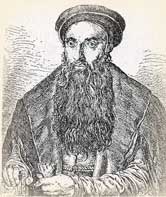From the beginning the reader must know that this list is not comprehensive, it is subjective and I am NOT an expert on church history (though I love studying it). Furthermore, the criteria of judgment is also subjective and therefore, I will likely be criticized by those who are actual scholars of church history.
The other important piece of information is this: How do I rate them? Or what is the criteria? Here it is: 1) their literary works; 2) their influence and 3) their place of leadership in the Reformation itself.
#15 Laski, John (1499-1560)
Brief biography
John Laski, best known in England as John à Lasco, was born in 1499 in Warsaw, the offspring of a noble Polish family.
After becoming a learned priest, he went in 1523 to Basel, where he was a close friend of Erasmus. After returning to Poland he rose to archdeacon of Warsaw, but because of his Calvinistic views he had to leave. He became pastor of a Protestant church at Emden in 1542 and shortly after went to England, where in 1550 he was superintendent of the church for Protestant foreigners and had some influence on ecclesiastical affairs in the reign of Edward VI. On the accession of the Roman Catholic Queen Mary he fled to the Continent. In 1556 he was recalled to Poland, where he was secretary to King Sigismund II and was a leader in the Calvinistic Reformation.
Key interactions
Met with Huldrych Zwingli who challenged him to read the scriptures for himself and influenced his view of The Lord’s Supper.
Lived in Desiderius Erasmus’ house in Basel and studied under him for a year (1524-1525).
Thomas Cranmer (English leader of the Protestant Reformation and Archbishop of Canterbury) places Laski on the same level as Philip Melancthon (or higher) in importance.
Key achievements
In the late 1530’s resigned from his Roman Catholic post of archdeacon and became a Protestant.
He pastored a church in the Netherlands in 1542 and then became the first Superintendent of the Friesland Reformed Church, retaining this office until 1550.
In 1550, Thomas Cranmer invited him and to come to England to strengthen the Protestant movement.
Cranmer then appointed his Polish friend as Supervisor of the ‘Stranger Churches’ (i.e. the churches of the foreigners in London) on the generous salary of £100 per annum.
The result of Laski’s persuasive powers and genius for church planting and organization caused him to be in demand all over Europe. But when “Bloody” Mary came to power in 1553, Laski’s influence in England was nipped in the bud. He was one of the first to be ordered out of the country with his congregation.
He became the general superintendent of the reformed churches in Little Poland.
He was one of the eighteen divines who translated the first Polish Bible (completed after his death in 1563).
Zanchy claimed that Laski belonged to the very greatest of the Continental Reformers and his name should always be quoted with that of Zwingli, Luther and Calvin.
